In previous articles, I’ve repeatedly pointed out that the relationships within New Zealand society are fundamentally different from those in Russian society. Now, I’d like to try to explain exactly how New Zealand culture differs from Russian. How culture shapes people’s values and behavior. And how understanding local culture can help with adaptation and employment.
In this article, I talked about how our family settled in Nelson. And here, I described my studies at NMIT, my first work experience, and volunteering.
For this analysis, I draw on my own observations as well as on methods developed by well-known researchers in cultural studies and cross-cultural communication: Geert Hofstede, Charles Hampden-Turner, and Fons Trompenaars. At the end of the article, I’ll share links to a few resources where you can compare the cultural dimensions of different countries and learn more about the specifics of New Zealand culture. I’ll also offer practical recommendations that helped my wife and me find permanent jobs and achieve our first level of financial stability in a new country.

Historical centre of Nelson
Cultural intelligence
Let’s begin with the concept of Cultural Intelligence or Cultural Quotient (CQ). As the name suggests, it’s not just knowledge about a culture, but primarily the ability to accept cultural differences and interact effectively with people from different cultural backgrounds.
People with a high level of cultural intelligence can easily adapt in a multicultural society. Those with a low level, understandably, struggle. New Zealand is a multicultural country. Around a quarter of its permanent population was born overseas. That’s why cultural intelligence plays a significant role overall, and especially when applying for jobs. In some companies, candidates (regardless of position) are given behavioral tests to assess their responses to situations involving cross-cultural interactions.

National park Abel Tasman
For example, early in my studies, I was irritated when classmates from India would walk up and read what I was typing on my laptop. That kind of behavior would be considered inappropriate where I come from, so I had the urge to respond sharply. But reacting that way could permanently ruin the relationship and make you come across as rude. If you’re prepared for such cultural traits, you can avoid an uncomfortable situation simply by closing your laptop.
In a multicultural society, it’s important to constantly build cultural competence. It’s the key to successful cross-cultural communication. You can read about the cultures you’re likely to interact with, ask questions without hesitation, and remain observant and sensitive to those around you.
It’s also believed that successful adaptation to a new culture requires motivation. In other words, if you have a clear goal, you’ll also have the drive to adapt.
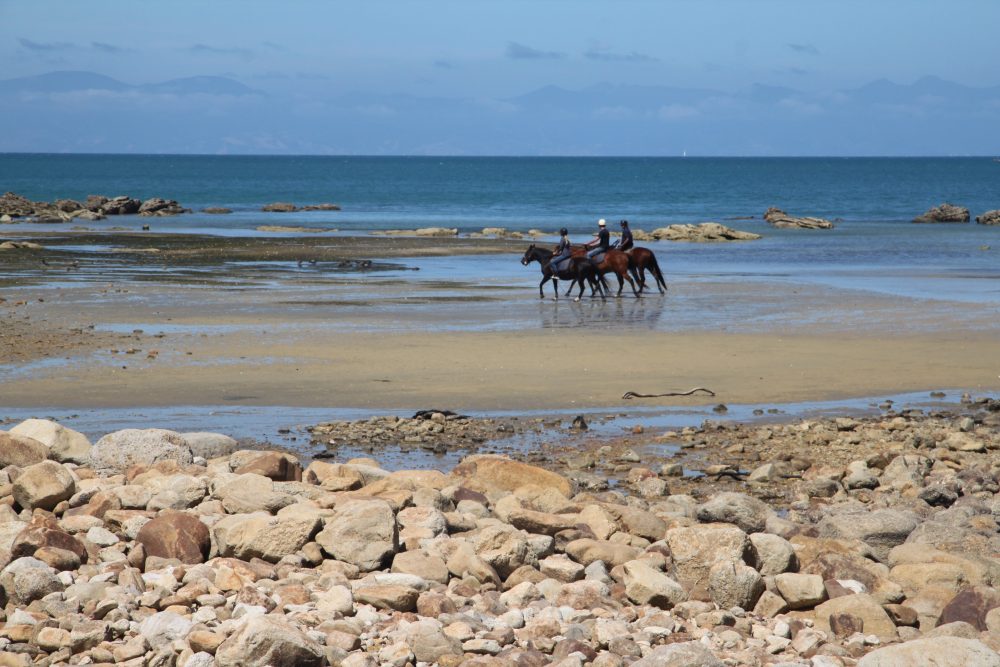
National park Abel Tasman
Achievement culture
New Zealand is an achievement-oriented culture. This means a person’s status is defined by how well they perform their role, not by their title, background, or financial standing, as it is in ascription or relationship-based cultures. Such different views on social status can sometimes lead to misunderstandings between people of different cultural backgrounds.
Not long ago, I attended a job interview where a German manager (from an achievement culture) was interviewing a candidate from Sri Lanka (an ascription culture). When asked, “Why do you think we should offer you this job?” the Sri Lankan man pulled out a thick album with 50 pages of certificates, letters of appreciation, and photos with important people dating back to his school years. He sincerely believed that a photo of the country’s president shaking his hand was the perfect answer to that question. But the manager was only interested in hearing about his professional skills and motivation.
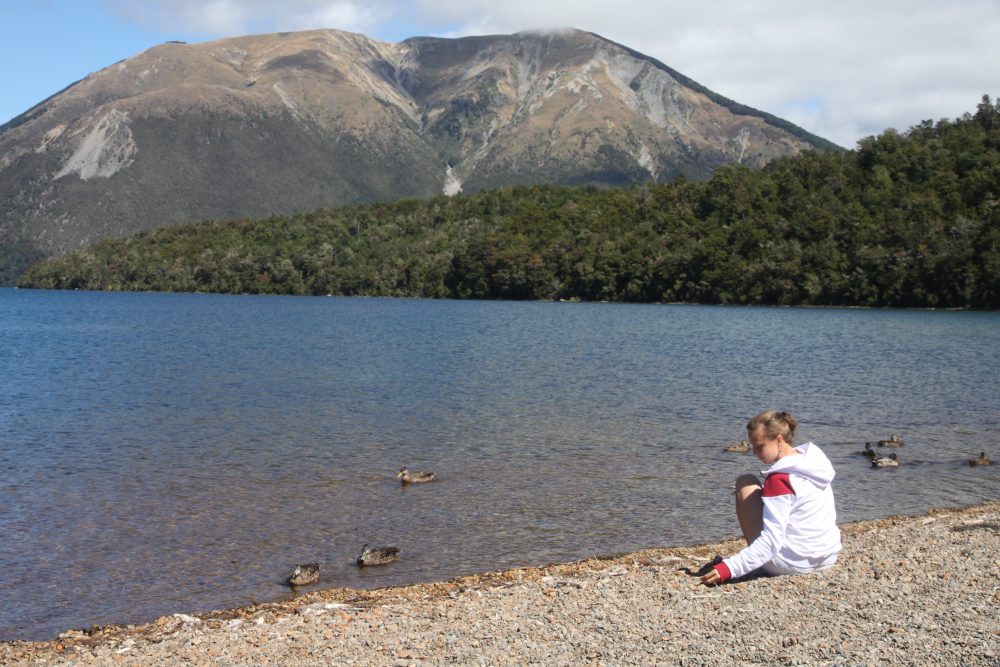
National park Nelson Lakes
Russia, too, is a vivid example of an ascription culture. We often associate our social status with job titles and expect that our previous positions will carry weight with New Zealand employers. I remember how I felt a bit shocked when, at my first New Zealand interview, no one asked about my leadership achievements—instead, they asked if I had steel-toe work boots (for safety during installation work). It wasn’t the physical labor that bothered me, but the fear of how such a “demotion” in status would be perceived by friends and acquaintances back in Russia.
But the reality is, when we move to New Zealand, we enter a different cultural system. And our sense of status must be reevaluated through the lens of local values. The famous New Zealand work-life balance, often misunderstood as simply “work and rest,” actually reflects the idea that your work role doesn’t define your identity in other areas of life. That’s why no type of work should be looked down upon. Do your job, do it well, and enjoy the process. You’ll soon find yourself appreciated and respected.

Cycling in Nelson
Perception of power
An even greater cultural difference between Russia and New Zealand lies in power distance. This concept refers to how members of a society accept unequal distribution of power. In countries with high power distance (like Russia), authority is seen as a privilege and a mark of social superiority. People tend to accept inequality in organizations and defer to authority figures.
In my first job in Russia, we had to stand up whenever the CEO entered the room. Occasionally, he would descend from his office for a tour of his “kingdom,” flanked by an entourage, delivering reprimands along the way. And honestly, no one really minded—it was just the norm.
In contrast, New Zealand has a low power distance. Power is viewed more as a tool for coordination than as a status symbol. Even within hierarchies, relationships are based on mutual respect and equality. Managers are approachable, open to employee ideas, and often delegate decision-making. In both of the New Zealand companies where I work now, the relationships between managers and staff are highly respectful. Instructions are usually phrased as, “Do you want to…” or “If you’d like…”.
There’s no sense of superiority. A site manager and a garbage truck driver will sit at the same table for tea. What matters is the result. If a manager needs to take off his blazer and sweep the floor to get the job done, he will do it. And his status won’t suffer, it will only rise.
So during a New Zealand job interview, you can feel completely at ease. No matter who you’re talking to, you’ll be treated as an equal.

Trip to French Pass
Attitude toward unknown
Imagine you’re Chinese and you move to Russia. You continue speaking mostly your native language, spend time only with fellow Chinese people, and still dress as you would back home. Now try to imagine your chances of landing a permanent job in an ordinary Russian company. Not great, right?
This is because Russia has a high level of uncertainty avoidance. People tend to steer clear of unclear or unfamiliar situations and often view those who are “different” with suspicion.
In New Zealand, uncertainty is approached differently. It is more as an opportunity to learn something new or at least neutrally. People here are much more accepting of those from other cultures. I still remember how touched I was when, on my first day at work, I received a welcome email from the HR manager that began with “Privet, Oleg!” They had taken the time to look up how to say “Hello” in my native language—a small gesture, but one that showed real respect for my background.
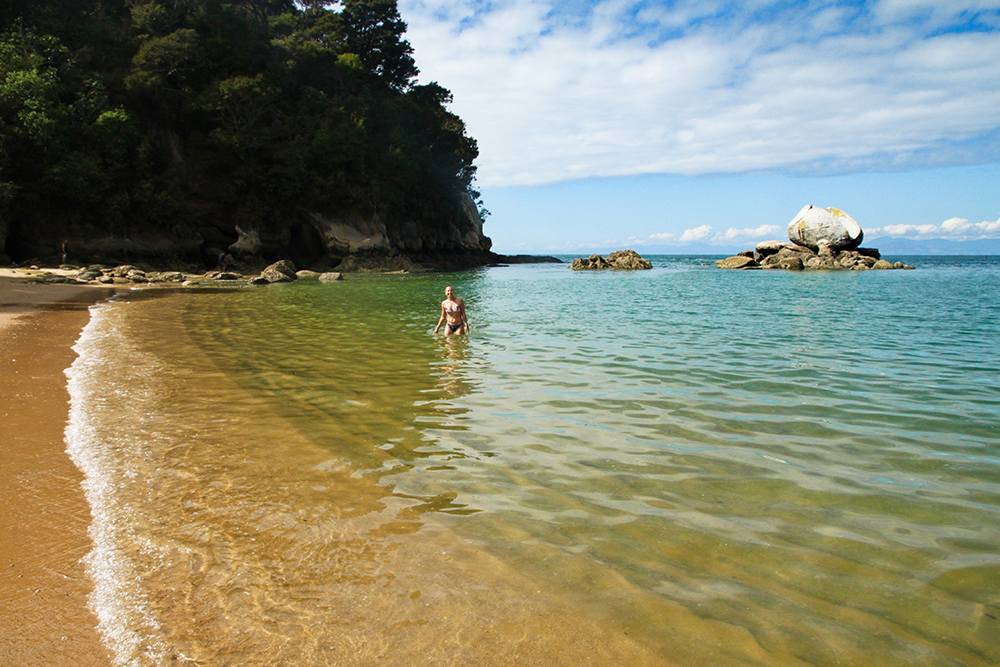
Famous beach Split Apple
Recently, I came across a video featuring famous Russian comedians. They’re performing on stage while audience members dance along. Women in boots with handbags, men in suits, girls in high heels. It looks like a typical big Russian corporate party. But the video was actually filmed in Australia.
It made me realize that even when people move to the other side of the world, they often stay exactly the same in terms of musical tastes and appearance. And here in Nelson, we meet many Russians who’ve lived here for 15–20 years, and you can still spot “one of ours” from a distance.
I’m not saying that’s good or bad. I’m only saying that clinging to your cultural identity doesn’t get in the way of being accepted in New Zealand society. As long as you don’t impose your values on others and show respect for other cultures, everything works just fine.

Hike to Whispering Falls
Measure of happiness
New Zealand is a country where people openly express happiness and life satisfaction. In sociology, this is described by the indulgence vs. restraint index. New Zealand ranks very high on this scale—on par with joy-loving Latin American countries.
As a result, New Zealanders are not only generally content but expect others to show positivity too. I remember visiting a local family where a German couple was also present. The man chatted happily with the hosts, but the woman mostly stayed silent. After they left, the hosts commented that her behavior had been rude—even though to me, she just seemed introverted.
Russians, by contrast, score much lower on the indulgence index. We’re a very restrained nation. We’re used to controlling our emotions and desires, which to New Zealanders can come across as cold or unapproachable. And we often misread typical New Zealand friendliness. For example, when someone smiles warmly at us and makes direct eye contact during an interview, we might assume we’re getting the job. But it’s just part of casual, friendly communication—it doesn’t necessarily mean anything.
Eventually, I realized that employers here were looking for more than just skills and experience in an applicant. So, I began including a link in my cover letters to an article I had written about our family’s move to Nelson. To show that we’re open, positive-minded people who came to New Zealand in search of a happy, meaningful life.
It worked. First for me, and later for my wife.
Sincerity and zest for life are truly valued here.
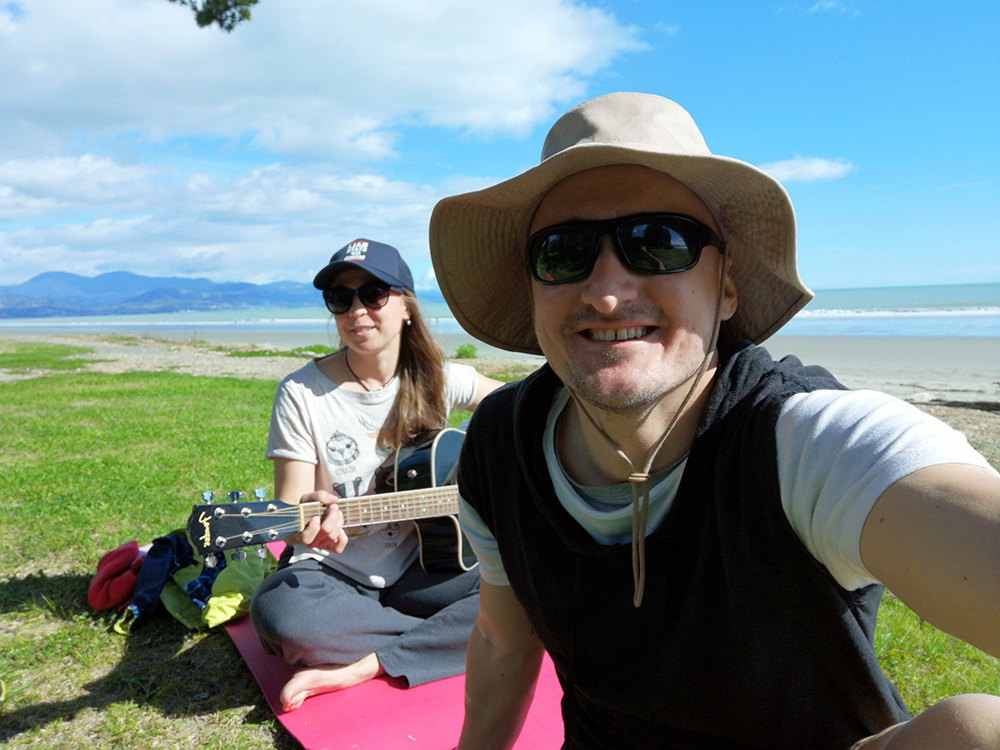
My wife an I on the Rabbit Island
Recommendations
As we can see, New Zealand culture is significantly different from Russian culture. Understanding these cultural differences is a key factor for successful adaptation to New Zealand society. Especially if your future job involves a high level of communication. Be attentive to local cultural norms, stay open-minded, cheerful, and patient, and speak about your own culture with genuine respect. People here really appreciate that.
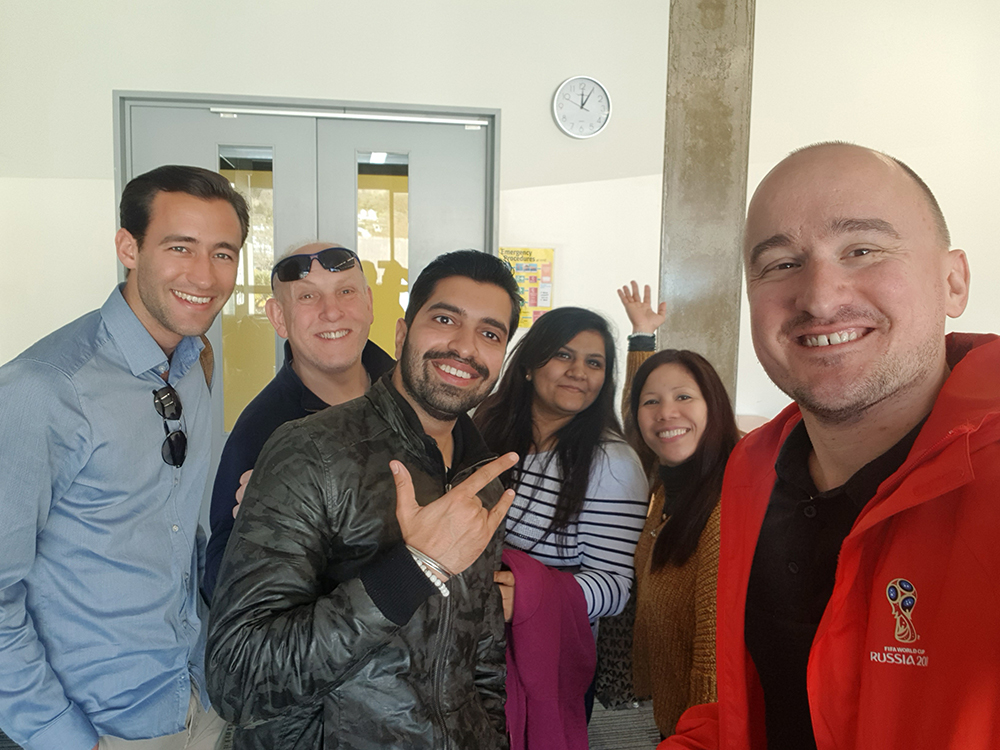
Group of students from different countries at NMIT
And a few more important tips:
Start working in any available position. It’s often easier to get a casual or fixed-term job first, as the competition and selection process are usually less intense than for a permanent role. Remember, most employers prefer not to be someone’s first New Zealand employer—but getting from the first job to the second is much easier.
Volunteer experience can be incredibly helpful. It’s a great way to adapt culturally and gain valuable references for future employment. References are especially important here. It’s essential to have someone who can recommend you. So:
- Keep in touch with former supervisors from your home country.
- Make a great impression in your first job.
- Expand your network: talk to classmates, colleagues, teammates, fellow volunteers, and even strangers on the street. In New Zealand, networking is a huge advantage.
Thank you for reading! I’d be happy to answer any further questions. You can reach me on Facebook.
Useful links:



